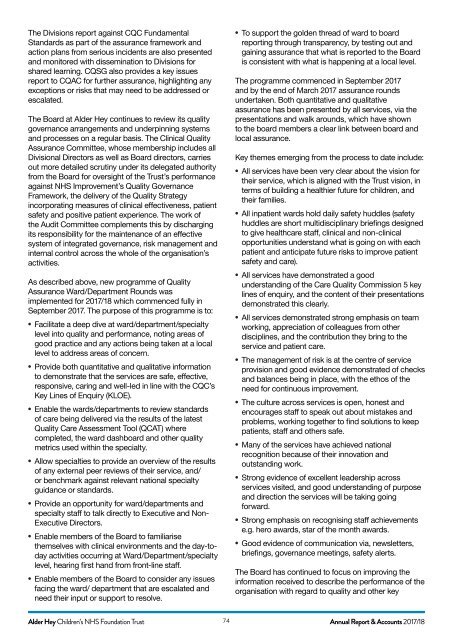AH ANNUAL REPORT 2018
Create successful ePaper yourself
Turn your PDF publications into a flip-book with our unique Google optimized e-Paper software.
The Divisions report against CQC Fundamental<br />
Standards as part of the assurance framework and<br />
action plans from serious incidents are also presented<br />
and monitored with dissemination to Divisions for<br />
shared learning. CQSG also provides a key issues<br />
report to CQAC for further assurance, highlighting any<br />
exceptions or risks that may need to be addressed or<br />
escalated.<br />
The Board at Alder Hey continues to review its quality<br />
governance arrangements and underpinning systems<br />
and processes on a regular basis. The Clinical Quality<br />
Assurance Committee, whose membership includes all<br />
Divisional Directors as well as Board directors, carries<br />
out more detailed scrutiny under its delegated authority<br />
from the Board for oversight of the Trust’s performance<br />
against NHS Improvement’s Quality Governance<br />
Framework, the delivery of the Quality Strategy<br />
incorporating measures of clinical effectiveness, patient<br />
safety and positive patient experience. The work of<br />
the Audit Committee complements this by discharging<br />
its responsibility for the maintenance of an effective<br />
system of integrated governance, risk management and<br />
internal control across the whole of the organisation’s<br />
activities.<br />
As described above, new programme of Quality<br />
Assurance Ward/Department Rounds was<br />
implemented for 2017/18 which commenced fully in<br />
September 2017. The purpose of this programme is to:<br />
• Facilitate a deep dive at ward/department/specialty<br />
level into quality and performance, noting areas of<br />
good practice and any actions being taken at a local<br />
level to address areas of concern.<br />
• Provide both quantitative and qualitative information<br />
to demonstrate that the services are safe, effective,<br />
responsive, caring and well-led in line with the CQC’s<br />
Key Lines of Enquiry (KLOE).<br />
• Enable the wards/departments to review standards<br />
of care being delivered via the results of the latest<br />
Quality Care Assessment Tool (QCAT) where<br />
completed, the ward dashboard and other quality<br />
metrics used within the specialty.<br />
• Allow specialties to provide an overview of the results<br />
of any external peer reviews of their service, and/<br />
or benchmark against relevant national specialty<br />
guidance or standards.<br />
• Provide an opportunity for ward/departments and<br />
specialty staff to talk directly to Executive and Non-<br />
Executive Directors.<br />
• Enable members of the Board to familiarise<br />
themselves with clinical environments and the day-today<br />
activities occurring at Ward/Department/specialty<br />
level, hearing first hand from front-line staff.<br />
• Enable members of the Board to consider any issues<br />
facing the ward/ department that are escalated and<br />
need their input or support to resolve.<br />
• To support the golden thread of ward to board<br />
reporting through transparency, by testing out and<br />
gaining assurance that what is reported to the Board<br />
is consistent with what is happening at a local level.<br />
The programme commenced in September 2017<br />
and by the end of March 2017 assurance rounds<br />
undertaken. Both quantitative and qualitative<br />
assurance has been presented by all services, via the<br />
presentations and walk arounds, which have shown<br />
to the board members a clear link between board and<br />
local assurance.<br />
Key themes emerging from the process to date include:<br />
• All services have been very clear about the vision for<br />
their service, which is aligned with the Trust vision, in<br />
terms of building a healthier future for children, and<br />
their families.<br />
• All inpatient wards hold daily safety huddles (safety<br />
huddles are short multidisciplinary briefings designed<br />
to give healthcare staff, clinical and non-clinical<br />
opportunities understand what is going on with each<br />
patient and anticipate future risks to improve patient<br />
safety and care).<br />
• All services have demonstrated a good<br />
understanding of the Care Quality Commission 5 key<br />
lines of enquiry, and the content of their presentations<br />
demonstrated this clearly.<br />
• All services demonstrated strong emphasis on team<br />
working, appreciation of colleagues from other<br />
disciplines, and the contribution they bring to the<br />
service and patient care.<br />
• The management of risk is at the centre of service<br />
provision and good evidence demonstrated of checks<br />
and balances being in place, with the ethos of the<br />
need for continuous improvement.<br />
• The culture across services is open, honest and<br />
encourages staff to speak out about mistakes and<br />
problems, working together to find solutions to keep<br />
patients, staff and others safe.<br />
• Many of the services have achieved national<br />
recognition because of their innovation and<br />
outstanding work.<br />
• Strong evidence of excellent leadership across<br />
services visited, and good understanding of purpose<br />
and direction the services will be taking going<br />
forward.<br />
• Strong emphasis on recognising staff achievements<br />
e.g. hero awards, star of the month awards.<br />
• Good evidence of communication via, newsletters,<br />
briefings, governance meetings, safety alerts.<br />
The Board has continued to focus on improving the<br />
information received to describe the performance of the<br />
organisation with regard to quality and other key<br />
Alder Hey Children’s NHS Foundation Trust 74<br />
Annual Report & Accounts 2017/18


